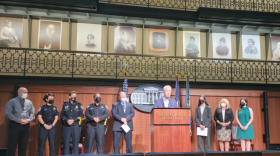Louisville Metro is in favor of a federal study into the historical and lingering impacts of slavery in the United States and reparations for Black descendants of slavery.
Mayor Greg Fischer signed a resolution Thursday affirming that position and throwing the city’s support behind Congressional legislation.
HR 40 would create a commission to “examine slavery and discrimination in the colonies and the United States from 1619 to the present and recommend appropriate remedies.”
Council Member Jecorey Arthur, a Democrat who represents District 4, co-sponsored the resolution.
During a press conference, he said this kind of resolution is “long overdue.”
“And not only is it overdue, we have been skipped, we have been stepped on, we’ve been stepped around,” he said, noting how other minority groups the U.S. has treated unjustly or cruelly, including Native and Japanese Americans, have received reparations.
“But for some reason, over the course of hundreds of years, we have never received what is owed to us, the debt that is owed to us,” Arthur continued. “This resolution is saying that we without a doubt support that this repair must be made.”
Michael Meeks, the city’s interim chief equity officer, said this resolution is “not only about Black American descendants of slaves.”
“It’s about America,” he said. “It’s about America, and Americans, setting out to deliberately right a historic wrong… this resolution is an example of exactly what local jurisdictions across the United States should be doing to address this pressing national issue.”
The resolution said that because of “longstanding and pernicious practices” such as redlining, share-cropping and unfair criminal justice treatment, “Black Americans continue to be burdened with significantly worse health, educational, and employment opportunities.”
Metro Council approved it last month 13-8-4.
Four Democrats, Council Members Rick Blackwell of District 12, Cindi Fowler of District 14, Madonna Flood of District 24 and Amy Holton Stewart of District 25 voted present, while all seven Republican members and Democrat Mark Fox of District 13 opposed it.
District 19 Council Member Anthony Piagentini, a Republican, voted against the resolution, saying there was not enough evidence proving that reparations “is the best and most efficient way” to rectify this issue.
At Thursday’s press conference and signing, Fischer said he was “very proud of the Council for passing this resolution.”
He said Americans cannot change the nation’s history.
“But the last thing we should do is deny the history,” he said. “And for far too long that’s happened in this country and primarily by people that have skin color than I have.”
Fischer has expressed support for federal reparations legislation in the past, including during his term as president of the U.S. Conference of Mayors.
During Thursday’s press conference, the mayor said it’s long overdue for cities and the country to truly reckon with systemic racism.
“So for folks who try to whitewash this over, or put some kind of conspiracy theory around this is some injustice or misleading white people, trying to make other white people feel bad about themselves, that’s not what this is,” he said. “This is about standing up to the truth.”
The U.S. House bill lays out three objectives for the commission: identify the role federal and state governments played in “supporting the institution of slavery”; note ways the public and private sectors discriminated against freed enslaved people and their descendants; and recognize the continued negative effects of slavery on present-day Black Americans and society.
Other municipalities across the U.S. are considering, supporting, and in cases, like Chicago suburb Evanston, Ill., implementing reparations programs to address the racial wealth gap and inequities experts attribute to centuries of institutionalized racism and discrimination in the U.S.
Arthur said only the federal government has the financial capacity to distribute reparations.
“So next step, for me personally as a member of the American Descendants of Slavery, is to introduce similar resolutions across across this country, to continue to send that message and put President [Joe] Biden, Vice President Kamala Harris and all Congressional leadership on notice that they need to move forward on this as soon as possible,” he said.




